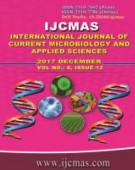


 National Academy of Agricultural Sciences (NAAS)
National Academy of Agricultural Sciences (NAAS)

|
PRINT ISSN : 2319-7692
Online ISSN : 2319-7706 Issues : 12 per year Publisher : Excellent Publishers Email : editorijcmas@gmail.com / submit@ijcmas.com Editor-in-chief: Dr.M.Prakash Index Copernicus ICV 2018: 95.39 NAAS RATING 2020: 5.38 |
Organic farming is an eco-friendly agro ecosystem that helps maintain soil health in terms of biological fertility and productivity and bacterial communities in soil play an essential role. A Model Organic Farm (MOF), developed in 2002 to demonstrate organic farming modules among the farming community, is utilized to study bacterial composition, diversity, seasonal variations, and plant growth promotion (PGP) traits of the soil. We observe rich bacterial diversity in MOF soil in terms of types and PGP traits. Rich bacterial diversity in MOF soil is represented by heterotrophs, coliforms, Pseudomonas spp., Azotobacter spp. and Rhizobium spp. and majority of these microorganisms display multiple PGP traits. Bacterial isolates are predominately positive to production of ammonia (NH3) (93.2%), indole acetic acid (IAA) (89.6), catalase (85.0), 1-aminocyclopropane- 1-carboxylate deaminase (ACCD) (78.6%) and siderophore (69.0%). Richness of their functional characteristics is further revealed by tolerance to salinity and wide range of pH. All the isolates are tolerant to > 5 % NaCl and wide range of pH. Furthermore, majority (96-97%) of the bacterial population of nitrogen fixers are Azotobacter spp. and Rhizobium spp. with multiple PGP traits, tolerance to salinity and wide range of pH. The present study demonstrates that organic farming enriches soil fertility and biodiversity, as well as, less dependent on external high inputs. Thus organic farming offers promise of achieving ecological, economic and social stability in food production system.
 |
 |
 |
 |
 |